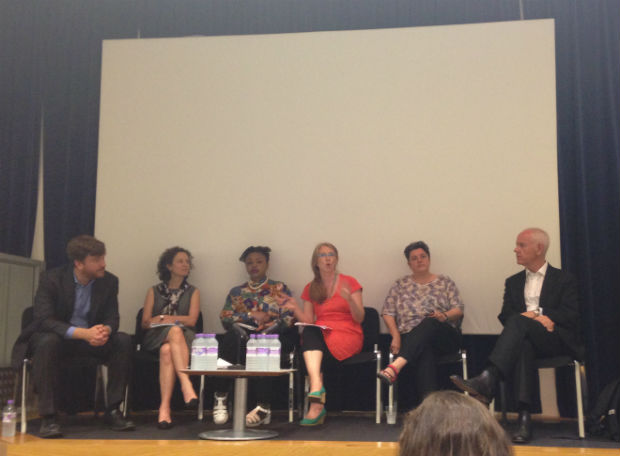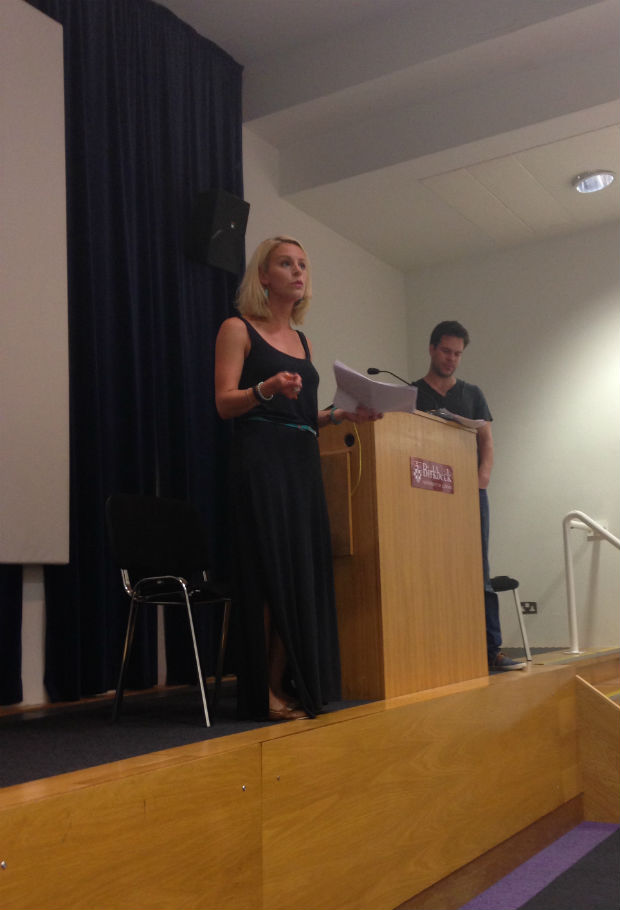Index relies entirely on the support of donors and readers to do its work.
Help us keep amplifying censored voices today.
[vc_row][vc_column][vc_column_text]
We recognise that the event organiser Jeremy Goldstein has apologised for his mistake and offered to reinstate Bindel on the panel and she has refused.
Index believes that all speech – eccentric, contentious, heretical, unwelcome, provocative, bigoted – should be protected unless it directly incites violence.
Index on Censorship will no longer support this event.[/vc_column_text][vc_basic_grid post_type=”post” max_items=”4″ element_width=”6″ grid_id=”vc_gid:1540388883065-dedbf93b-0675-9″ taxonomies=”6534″][/vc_column][/vc_row]

The panel (from left): Greg Lukianoff, Nicola Dandridge, Siana Bangura, Jodie Ginsberg, Julie Bindel and Ken Macdonald (Photo: Index on Censorship)
“I am proud to say that I, myself, am a trigger warning,” said journalist and author Julie Bindel, speaking at the launch of the summer issue of Index on Censorship magazine and its special report on academic freedom.
The panel, chaired by Index chief executive Jodie Ginsberg, also included Universities UK chief executive Nicola Dandridge, blogger and spoken-word poet Siana Bangura, author and president of the Foundation for Individual Rights in Education (FIRE) Greg Lukianoff, and former director of public prosecutions and warden of Wadham College Lord Ken Macdonald.
The debate covered a wide range of issues related to academic freedom globally, from safe spaces and the right to offend, to the absence of absolute freedom of speech and illegal versus legal speech. The event started with a performance from actors Jessica Guise and Jack Wharrier, based on interviews with students and academics from across the world about how it felt to be working and studying in the academic sphere today.
“It’s a very few highly privileged, pampered students who sit around controlling feminists societies,” said Bindel, who has been no-platformed by the UK’s National Union of Students over her writing, adding that “what they’re doing is bullying some of the less vocal, less confident women in the room”.
Lukianoff identified the bureaucratisation of universities, fear of liability and ignorance of the law as challenges to academic freedom in the US.
“I’m a First Amendment lawyer, but you don’t have to be a First Amendment lawyer to know that under the American First Amendment you can’t tell someone that they’re restricted to a tiny ten by ten zone on a massive public campus and that’s the only place they can hand out copies of the constitution. Yet nonetheless I have to take universities to court in order to demonstrate that,” he said.

Actors Jessica Guise and Jack Wharrier performed interviews with students and academics from across the world (Photo: Index on Censorship)
Bangura posed the question of who freedom of expression is for at universities. Among other things, she pointed to the lack of diversity among UK professors, of which only 0.49% are black. “When we’re always talking about who gets to say what, there’s a certain type 0f person saying stuff in the first place.”
She also addressed the idea that students are limiting free expression on campus: “I think as much as students are part of this debate, we are ignoring the bigger powers that be. Students only have a limited amount of power.”
The issue of security was also discussed. “How, from a universities perspective, do you manage these events if you have good reason to believe there could be violence if someone speaks?” questioned Dandrige.
On this, Macdonald spoke of the dangers of a “heckler’s veto”, saying: “I can ring up any university and say ‘I’m going to do a bomb threat if professor Norman Finkelstein is speaking next week’ and so the university cancels the event. This is a heckler’s veto.”
Read more about the global situation for freedom of expression on campus in the latest issue of Index on Censorship magazine. You can see two short videos from the debate below.
This article was posted on 2 July 2015 at indexoncensorship.org
Education, the beginning of so many roads. But if we start closing some of those avenues down, arguing they are too dangerous or challenging, do we begin to travel in a terrifying direction?
From no-platform policies to campus extremism, and student sit-ins to the correct balance between safety and liberty, join us to explore the global situation for freedom of expression on campus.
Come to our lively Question Time-style discussion, chaired by Index on Censorship’s CEO Jodie Ginsberg and introduced by magazine editor Rachael Jolley.
With speakers including:
Followed by a summer drinks reception.
When: Wednesday 1 July, 6:30-7:30pm event, followed by drinks reception
Where: Clore Centre, Birkbeck College, University of London, WC1E 7HX (Map/directions)
Tickets: Free, registration is required as space is limited.
Presented in conjunction with The Conversation, SAGE Publishing and Arts Council England.


(Illustration: Shutterstock)
There is, I am told, a war going on in feminism. A war between “intersectionalists” (I think) and TERFs (Trans-Exclusionary Radical Feminists, as far as I can tell).
I am not about to stick my oar into this particular boating lake, for two reasons:
Reason 1. Self-awareness. I am a white middle class western European media professional, north-London dwelling male, born in a time when there is little chance of conscription. I am practically the most privileged thing that ever existed, and the last thing people struggling for equality need is me, turning up, cheerily shouting “Only me!!!” like Harry Enfield’s Mr-You-Don’t-want-to-do-it-like-that, and telling people how to do a real feminism. That is not to say I do not have a right to have an opinion, but…
Reason 2: lurking in that apparently placid boating lake are piranhas, reading to chew up and spit out any oarsman (or woman) who does not know every ebb and eddie of the lake.
It’s a horrible sight to see. Every so often some poor naive jumps in their little pleasure boat, having been assured by the man that it’s perfectly safe, and rows happily to the middle of the lake. You watch from the shore. They wave back. What’s that sound? They’re singing Sister Suffragette from Mary Poppins, their rowing keeping a brisk beat with the jaunty marching tune. “Shoulder-to-shoulder” and-stroke-and-stroke.
Unbeknownst to them, the piranhas have smelled blood. They row on. Gleefully, they reach the crescendo: “Our daughters’ daughters’ will adore us…”. They raise their hands to punch the air. An unattended oar slips into the water. The piranhas stir. Daughters? That sounds like determinism. The water begins to froth. The poor unsuspecting oarsman (or woman) is still singing. Eventually they catch the commotion in the corner of one eye: they hear it grow louder, under the boat, which now seems irresponsibly flimsy.
They sing still, but now in trepidation: “No more the meek and mild subservients we!”.
The frenzy grows stronger, at what was certainly a slight on members of the BDSM community (well, the Ms anyway). Stronger and stronger. Our rower tries to resist, we can see, but the boat is now falling apart, as if rotten, under their feet. Our previously carefree rower feels first a nip, and then a rush. They are simultaneously drowning and being eaten alive.
A final defiant shriek from a the near-eviscerated pleasure seeker, and then there is nothing. The waters are calm once more.
We tut, from the shore. Such a shame, such a loss. Did you see the cowbell dog?
That’s one version, but then try to see it from the fishes’ point of view. Fish have got to live. Piranhas have been, for years, maligned as a generality by the mainstream. The very word “piranha” is thrown around as an insult. Piranhas are irrational, illogical, even abominations against nature. And of course, there is more than one type of piranha, and not every piranha has the same experience of what it’s like being a piranha. Piranha identity is complex, to say the least. But that doesn’t mean piranhas shouldn’t bond together and work together. What outsiders view as a “feeding frenzy” is actually the best – only – way piranhas can continue to exist safely.
Besides, the piranhas grew up in this lake. They know it like the back of their fins – how to navigate, how to communicate. If anyone’s in a wrong place in the boating lake, it’s not the piranhas.
This is not an unreasonable case. The question then (and here’s where the horrendous tortured boating lake analogy comes to an end, you’ll be pleased to know) is: Was George Bush right? Can the human beings and the fish coexist peacefully?
The issue emerged again recently with a terse exchange of letters in the Observer newspaper, which followed the cancellation of a show by comic Kate Smurthwaite at Goldsmith’s college. Smurthwaite said she’d been banned because some university feminists who are pro sex work were threatening to protests against her anti sex work views, and the college security didn’t want the hassle.
A letter was put together, as letters are, decrying campus censorship and the narrowing of debate (with specific mention of the National Union of Students’ policy of “no-platforming” feminist Julie Bindel for statements on trans people). There was a response, disputing the facts of the first letter and suggesting that there are bigger campus free speech issues – around student protest for example – than whether certain already powerful people can take part in a panel debate or a comedy show.
The problem here is the commodification of free speech: who is allowed it and who isn’t, and, in hierarchical societies (i.e. pretty much every society we’ve come up with so far) who grabs it as theirs and who should be granted more in order to even things out, and who can “use” free speech against whom.
This is to treat free speech as a weapon rather than a space. There is not a limited amount of free speech to go round: rather, there is a (hopefully) ever-expanding free speech arena in which we can argue. The signatories of both letters have actually identified the same problem, the narrowing of the space, particularly in education. Perhaps it would be beneficial for them to defend the space in which to argue rather than trying to push the other side overboard.
This article was posted on 26 February 2015 at indexoncensorship.org